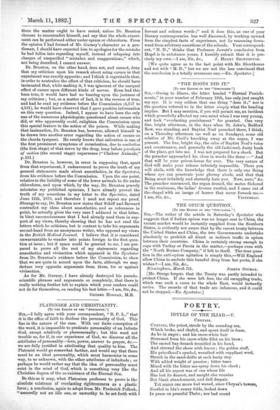POETRY.
IDYLLS OF THE ILIAD.—V.
CHRYSES.
CHRYSES, the priest, strode by the sounding sea, Which broke, and chafed, and spent itself in foam, As he in anger; and his snow-white hair Streamed from his snow-white fillet on his brow; The sacred bay-branch trembled in his hand, And strewed the shore with leaves ; the golden staff, His priesthood's symbol, wreathed with suppliant wool, Struck in the sand-drifts at each hasty step With added weight of passion ; bitter tears Mixed with the bitter sea-spray down his cheek; And all his aspect was of one whose life Has lost its dearest, and naught else remains But blank abandonment, and dull despair.
Yet scarce one moon had waned, since Chrysa's towers,
Nestled in Ida's sunny folds, looked down In peace on peaceful Thebe; nor had sound Of neighbours vexed with war, nor any fear, ' Troubled their rest; but daily smoke went up Of sheep, and wheaten flour, and fat of beeves, And all the land was guarded by its god.
- How changed the picture now ! No bleat of sheep, No lowing kine, nor glow of altar-fires, But women's wailings, and great gouts of blood, And trampled cornfields, and the sullen smoke Of ruined rafters, marked the spoilers' way. Gone was all peace ; gone, too, the fairest maid That ever twined a wreath of amaranth, Or wove a shrine with flowers. Day by day, Flitting in simple service to and fro, The young Chryseis, white-robed, golden-haired, Had brought new sunshine to the Sun-God's courts, And to her father's heart enduring joy, Priest Chryses. He, soon as the sudden storm Had swept and passed, with trembling haste pursued The invaders' backward path, nor slept, nor ate, Till in the council of the chiefs, and face Of Agamemnon, king of men, he stood.
The father's passion, and the outraged name Of priest, and proffered treasures of the shrine, Won all the Princes to the old man's prayer; Only Atreides, blind with lust of power, Brooked not the thwarting of his lightest will, And spake an evil menace,—" Dotard, hence !
Thy maiden bath found favour in my eight ; Therefore, begone; nor let mine eyes again, Or now or ever, see thee at the ships, Lest worse befall thee, nor you bauble-gauds Avail to shield thine hoary insolence."
So spake the King, infatuate, nor knew Kindling Apollo's anger. But the priest Shrank silent, fear, amazement, anger, grief, O'ermastering speech, and passed with aimless feet, That knew not where they trod, yet blindly sought The sympathy of solitude, and stir Of angry seas; till all his soul went forth In one fierce cry, that cleft the startled air, And shrieked its way to Heaven,—" Apollo, hear.!
God of the silvern bow, whose steps were erst Around my Chrysa, who encompassest Cilla, and thy might is known In white-cuffed Tenedos ! By all thy names, Where'er thou art, I, Chryses, claim thine aid !
Slayer of vilest vermin, Sminthian, hear Thy priest ! If all my boyhood, manhood, age, Have been a willing bondage to thy shrine, If lavished ornament, and stately piles, And blood of bulls and goats, and incense-smoke, Have done thee aught of grateful service, hear !
Hear my one prayer, and let thine arrows smite This godless horde of ravishers, who come To wreak their vengeance for the thing they do ;— Wreak Thou thy vengeance, Master, with thy shafts, And let their lives atone thy servant's tears."
There his voice broke with passion. But the God Had heard, and rose, and veiled his awful face In night more awful, and the far-off sands, Where late the suppliant's agony had stamped The feeble footprints of his wrath, now shewed A sudden wall of blackness. Shafts of fire, Blinding, unearthly, unendurable, Reft a white chasm ever and anon, And flashed and vanished ; and with every shaft A Grecian life was quenched. Nine nights, nine days, The blackness, and the fire, and death, and fear Were round the ships ; and on the tenth the King Was broken, for the curse of Gods and men Weighed heavy on him, and his sullen soul Was bowed, perforce, to let the maiden go. 0. OGLE.



































 Previous page
Previous page